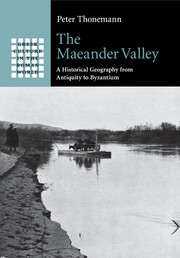Book contents
- Frontmatter
- Contents
- Maps and Figures
- Preface
- Acknowledgements
- Abbreviations
- Map 1 The Maeander valley
- 1 The valley
- 2 Hydrographic heroes
- 3 The nature of Roman Apamea
- 4 The fortress at Eumenea
- 5 The pastoral economy
- 6 The nobility of Mt Cadmus
- 7 The rural economy
- 8 The bounty of the Maeander
- Epilogue The historical geography of the Maeander valley
- Bibliography
- Index
7 - The rural economy
Published online by Cambridge University Press: 07 October 2011
- Frontmatter
- Contents
- Maps and Figures
- Preface
- Acknowledgements
- Abbreviations
- Map 1 The Maeander valley
- 1 The valley
- 2 Hydrographic heroes
- 3 The nature of Roman Apamea
- 4 The fortress at Eumenea
- 5 The pastoral economy
- 6 The nobility of Mt Cadmus
- 7 The rural economy
- 8 The bounty of the Maeander
- Epilogue The historical geography of the Maeander valley
- Bibliography
- Index
Summary
The agrarian revolution: from the kleros to the great estate
The earliest documentary evidence for land-tenure conditions in the lower Maeander valley dates to 334 bc, the year of the Macedonian invasion of Asia. In the summer of 334, Alexander III of Macedon proclaimed a ‘new deal’ for the Greek cities of western Asia Minor, granting them political autonomy and fiscal immunity from the tribute they had formerly paid to the Achaemenid monarchs. Later that year, the inhabitants of the small city of Priene on the north flank of the Maeander delta plain sent an embassy to the Macedonian king asking for clarification of the status of an ethnically mixed community on their territory, the harbour-town of Naulochon. The first part of Alexander's reply survives, having been inscribed on the north anta of the temple of Athena Polias at Priene two generations later, in the context of a later land dispute between Priene and the neighbouring city of Magnesia.
Of King Alexander. Of those living at Naulochon, as many as are [Greek]s shall be autonomous and free, holding their [land] and all their houses in the city, and also the territory, just like the Prieneans, [between the sea] and the [hill] of the Sandeis; but the [village of x], and the village of Myrs[- -] and the village of P[- – and their associated] land I recognise as mine, and those living in those villages shall pay the phoroi. I exempt the city of the Prieneans from the syntaxis, and the garrison…introduce…
As a result of Alexander's edict, the agricultural land around Priene on the north flank of the Maeander delta plain was classified under two headings. A continuous tract of land lying ‘between the sea and the hill of the Sandeis’ was assigned to the citizens of Priene and the Greek inhabitants of Naulochon, its dependent harbour-town. This land was immune from the royal land-taxes (phoroi), and individual citizen or non-citizen Greek landowners at Priene were at liberty to alienate their land as they pleased. Beyond this civic territory lay stretches of land which did not possess this privileged fiscal status, owned outright by the ruling monarch, and subject to a range of royal taxes in cash and in kind. This land, farmed by the inhabitants of indigenous villages in the Maeander delta plain, was subject to alienation by the king as he saw fit. As we shall see, the Hellenistic monarchs who succeeded Alexander regularly granted large tracts of ‘their’ lands in the lowland Aegean valleys of western Asia Minor to their officers, relatives and dependants, with major destabilising consequences for the wider pattern of landholding in the region.
- Type
- Chapter
- Information
- The Maeander ValleyA Historical Geography from Antiquity to Byzantium, pp. 242 - 294Publisher: Cambridge University PressPrint publication year: 2011



